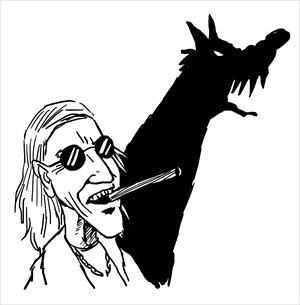BBC scandal shows dangers of unchecked self-regulation

The glow of celebrity has started to fade. People are becoming more convinced that there can be an ugly truth behind the glamour of fame. But when the powerful do evil, it can still be too hard to expose.
Jimmy Savile's sex abuse scandal is the latest evidence. The late Savile, a star host with the BBC, the UK's flagship media organization, has now been accused of sexually abusing hundreds of children over four decades.
Facing all the undeniable evidence and victims' accounts, the shocked public started to know the other side of a celebrity, a serial sex offender, who used his job to prey on women, girls and boys.
How was the ugly reality of Savile's crimes hidden for so long?
One of the major reasons that there has been such widespread shock is because this is yet another scandal in an already hard-hit UK media industry, one that the public traditionally trusted to serve society, not harm it.
The tabloid phone-hacking scandal, which led to the closure of the News of the World, sparked similar concerns.
Yet the two scandals are fundamentally different, despite both involving British journalism.
The phone-hacking scandal was focused on the definition of public interest, and what measures journalists could take in serving it. In this case, fundamentally good intentions became twisted into nothing but intrusions of privacy.
But there were no good intentions in the Savile scandal. It was simply the use of power to cover up evil.
The exposure of Savile's crimes should also leave us reflecting on the iniquities of celebrity culture.
Celebrity status is normally a double-edged sword, since the public seizes as eagerly on celebrities' failings as their successes. But Savile's unusual status as a beloved children's entertainer and charity star made it easy for people to ignore persistent rumors of his unsavory side.
In a culture where the voices of celebrities sometimes seem to drown out those of ordinary people, this comes as a stark warning.
Savile's crimes were exposed so late, and even posthumously, because confronting Savile's unshakable status, most victims chose silence. The few who attempted to go to the police or his bosses back in the 1970s, when most of the crimes were committed, were pushed away.
Even after Savile's death last year, the BBC's own flagship investigative journalism program, Newsnight, had its story on Savile's investigation, but wasn't able to broadcast due to BBC's internal interference.
The BBC's handling of the scandal, which seems to have been aimed first and foremost at protecting the corporation, has come under intense criticism, causing the most severe crisis of public trust in the institution since its founding in 1922.
As a public interest broadcaster, the BBC is funded by a mandatory television license fee paid by the UK public. In recent years, while its major commercial rivals suffer from financial shortfalls and falling ratings, the BBC has become even stronger.
Unlike most UK broadcasting media outlets, which are regulated by a government appointed body, Ofcom, the BBC is largely self-governed by the BBC Trust. But this self-regulating organizational and governance structure has long raised skepticism about its ability to deal with its own mess.
The BBC has also been hit hard by a follow-up scandal in which it falsely accused a former senior Conservative politician of involvement in a child abuse case in the 1970s, resulting in the resignation of the BBC's director general George Entwhistle. The allegations were, in fact, disproven in the 1990s.
In part, this came as a reaction to the Savile case; spurred by its failure to expose one powerful abuser, Newsnight leapt on the chance to expose another, only to fall flat on its face.
We can learn from this that for a healthy society to work, an independent legal system and social transparency should be in place to guarantee balance of power and plurality of voices. Savile was simply one evil man, but the institutional structures and culture that empowered him deserve serious consideration.
After the News of the World phone-hacking scandal, the Leveson Inquiry stated that Press Complaints Commission in the UK should have "more teeth" to regulate press behavior more effectively. Savile's sex abuse scandal may just be another turning point for more reflections on whether self-governance is a valid or sufficient system for safeguarding the public good.
Incorporating the BBC under an industry-wide regulator may be a better solution to guarantee both the corporation and its stars behave better.
The truth is bloody, the lessons are hard. Whether it's the News of the World phone-hacking scandal or a BBC presenter's unchecked pedophilia, the powerful, if not supervised, can easily do evil.
The author is a media commentator. opinion@globaltimes.com.cn